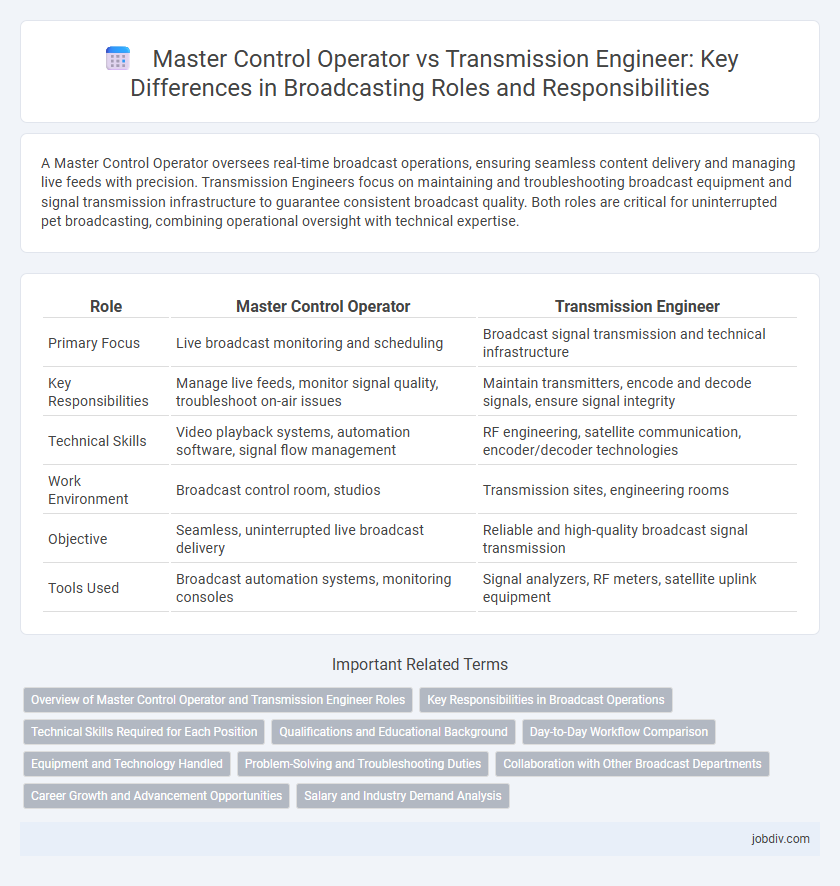A Master Control Operator oversees real-time broadcast operations, ensuring seamless content delivery and managing live feeds with precision. Transmission Engineers focus on maintaining and troubleshooting broadcast equipment and signal transmission infrastructure to guarantee consistent broadcast quality. Both roles are critical for uninterrupted pet broadcasting, combining operational oversight with technical expertise.
Table of Comparison
| Role | Master Control Operator | Transmission Engineer |
|---|---|---|
| Primary Focus | Live broadcast monitoring and scheduling | Broadcast signal transmission and technical infrastructure |
| Key Responsibilities | Manage live feeds, monitor signal quality, troubleshoot on-air issues | Maintain transmitters, encode and decode signals, ensure signal integrity |
| Technical Skills | Video playback systems, automation software, signal flow management | RF engineering, satellite communication, encoder/decoder technologies |
| Work Environment | Broadcast control room, studios | Transmission sites, engineering rooms |
| Objective | Seamless, uninterrupted live broadcast delivery | Reliable and high-quality broadcast signal transmission |
| Tools Used | Broadcast automation systems, monitoring consoles | Signal analyzers, RF meters, satellite uplink equipment |
Overview of Master Control Operator and Transmission Engineer Roles
Master Control Operators manage the real-time broadcast signal flow, ensuring seamless content delivery by monitoring equipment and switching feeds during live transmissions. Transmission Engineers focus on the technical infrastructure, maintaining and troubleshooting transmission systems, including satellite uplinks, broadcast transmitters, and signal encoding. Both roles are critical in maintaining broadcast quality and uninterrupted media distribution.
Key Responsibilities in Broadcast Operations
A Master Control Operator manages live broadcast feeds, ensuring seamless content playout and monitoring signal quality in real time to prevent interruptions. Transmission Engineers oversee the technical infrastructure of broadcast systems, including maintenance of transmitters, satellite uplinks, and signal distribution networks to guarantee reliable broadcast transmission. Both roles are critical in maintaining continuous and high-quality broadcast operations, with Master Control Operators focusing on content delivery and Transmission Engineers handling equipment integrity.
Technical Skills Required for Each Position
Master Control Operators require proficiency in real-time video switching, signal monitoring, and automated playback systems to ensure smooth broadcast operations. Transmission Engineers possess expertise in satellite communication, RF signal integrity, and troubleshooting complex transmission path issues to maintain signal quality and reliability. Both roles demand strong technical abilities, but Master Control Operators focus on operational systems, while Transmission Engineers handle infrastructure engineering.
Qualifications and Educational Background
Master Control Operators typically hold an associate degree or certification in broadcasting, with hands-on experience in video switching, signal monitoring, and broadcast equipment operation. Transmission Engineers often possess a bachelor's degree in electrical engineering, telecommunications, or a related field, combined with expertise in RF systems, satellite communications, and network infrastructure. Both roles demand technical proficiency, but Transmission Engineers usually require a stronger foundation in engineering principles and advanced technical problem-solving skills.
Day-to-Day Workflow Comparison
Master Control Operators manage live broadcasts by monitoring video feeds, switching between sources, and ensuring on-air content quality in real-time. Transmission Engineers handle the technical infrastructure, maintaining signal integrity, troubleshooting equipment, and overseeing satellite or fiber transmission systems. Both roles require coordination but differ as operators focus on live content delivery while engineers ensure stable signal transmission and infrastructure reliability.
Equipment and Technology Handled
Master Control Operators primarily manage broadcast automation systems, video servers, and routing switchers to ensure seamless live and recorded content transmission. Transmission Engineers focus on the technical maintenance and optimization of transmission equipment such as encoders, modulators, microwave links, and satellite uplinks to maintain signal integrity. Both roles require proficiency in digital signal processing, but Transmission Engineers handle more complex RF and transmission infrastructure technologies.
Problem-Solving and Troubleshooting Duties
Master Control Operators handle real-time monitoring and resolve immediate broadcast issues such as signal interruptions and content errors to ensure seamless transmission. Transmission Engineers focus on the maintenance and repair of technical equipment, diagnosing complex system faults in transmitters, satellite links, and RF components to prevent downtime. Both roles require strong problem-solving skills, but Transmission Engineers typically address long-term technical challenges, while Master Control Operators manage urgent operational troubleshooting.
Collaboration with Other Broadcast Departments
Master Control Operators coordinate closely with Production and Technical Operations teams to ensure seamless live broadcasts and signal integrity. Transmission Engineers collaborate with Engineering and Maintenance departments to troubleshoot and maintain transmission infrastructure, minimizing downtime. Effective communication between both roles enhances overall broadcast reliability and quality.
Career Growth and Advancement Opportunities
Master Control Operators typically focus on real-time broadcast monitoring and quality control, offering career growth through expertise in live content management and technical troubleshooting. Transmission Engineers specialize in maintaining and optimizing broadcast signal transmission infrastructure, with advancement opportunities in engineering leadership, network design, and technology integration. Both roles require technical proficiency but differ in career paths, with Transmission Engineers often accessing broader engineering and managerial positions.
Salary and Industry Demand Analysis
Master Control Operators typically earn between $40,000 and $60,000 annually, with demand driven by regional broadcast stations requiring real-time content management and signal monitoring. Transmission Engineers command higher salaries, generally ranging from $70,000 to $100,000, reflecting their specialized skills in maintaining and optimizing broadcast transmission infrastructure. Industry trends indicate growing demand for Transmission Engineers due to advancements in digital broadcasting technology and increased complexity of transmission systems.
Master Control Operator vs Transmission Engineer Infographic

 jobdiv.com
jobdiv.com